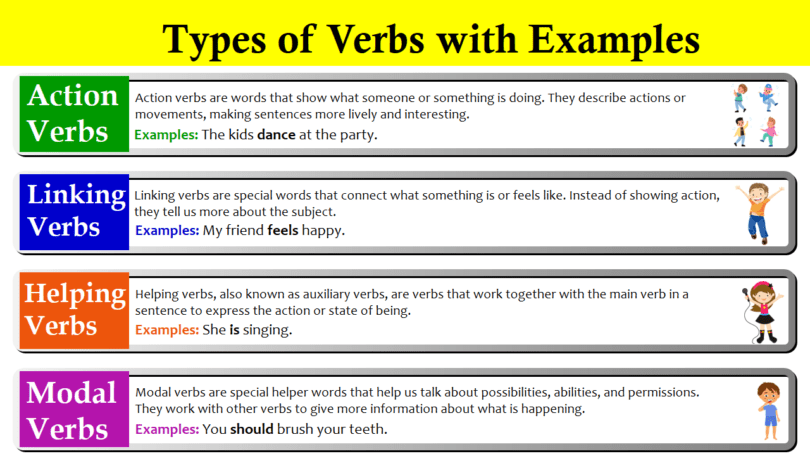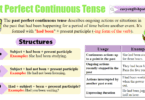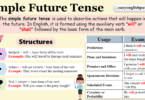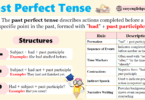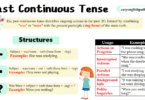As we know, so many different activities take place on regular routines. People go to the park. Teachers teach their students. Students learn English. These sentences are used to express different types of actions that happen in daily life. English Verbs are important in Grammar as they are a big source to describe our regular actions or activities that we do. We are supposed to express how things happen and that is possible only when we learn about verbs and some common types of verbs in English.
Verb Definition:
A verb is a word that shows action or describes what someone or something is doing. It can also tell us about a state, like feeling happy or being tired. So, whenever you see a word that shows an action or describes a condition.
- She dances gracefully.
- They eat pizza for dinner.
- He slept soundly last night.
- The dog barks loudly.
- We will travel to Paris next month.
Types of Verbs
- Action verbs
- Linking verbs
- Helping verbs ( auxiliary verbs)
- Modal verbs
- Transitive Verb
- Intransitive Verbs
- Phrasal verb
- irregular verbs
- Regular verbs
- Reflexive Verbs
- Finite Verbs
- Non-finite Verbs
Action Verbs
Action verbs are words that are used to that show actions. They are used to describe actions or movements that we make using our body or other objects. It also describes actions that our brain preforms like, Think and memorize.
- They run in the park.
- She reads a colorful book.
- We play with our toys.
- The rabbit jumps over the log.
Linking Verbs
Linking verbs are similar to stative verbs, these are the words that are used to describe what something is or feels like. Instead of showing action, they tell us more about the subject. They connect subject with verb compliment.
- The cake is delicious.
- My friend feels happy.
- The flowers smell amazing.
- The soup tastes salty.
- The cat looks curious.
Helping Verbs (Auxiliary Verbs)
Helping verbs, also known as auxiliary verbs, are verbs that work together with the main verb in a sentence to express the action or state of being. They provide support by adding more information about the timing, mood, or voice of the main verb.
- I am happy.
- We have a cat.
- She is singing.
- You will learn.
- He had a sandwich
Modal Verbs
Modal verbs are considered s subgroup of helping verb. These words are used to give sentences a unique look. Modal Verbs words help us talk about possibilities, abilities, and permissions. They work with other verbs to give more information about what is happening.
- I can swim.
- You should brush your teeth.
- She may come to the party.
- We must finish our homework.
- He might know the answer.
Transitive Verbs
A transitive verb is a type of action verb that requires one or more objects to complete its meaning in a sentence. These verbs express an action that is done to someone or something, and they transfer that action to a direct object.
- She ate a cookie.
- They built a sandcastle.
- He wrote a story.
- I bought a toy.
- She read a book.
Intransitive Verbs
An intransitive verb is an action verb that doesn’t require a direct object to complete its meaning in a sentence. It expresses an action or state without transferring that action to an object. Intransitive verbs typically stand alone in a sentence.
- The flowers bloomed.
- The baby cried.
- The sun sets.
- The river flows.
- They Laughed.
Phrasal Verbs
Phrasal verbs are combined with the following elements : verb, prepositions and adverbs that consist of a different meaning from those individual words that are used to form them.
- I need to get up early tomorrow.
- He met up with an old friend at the store.
- She gave up chocolate for a month.
- We need to figure out the answer to the problem.
- He ended his relationship with his girlfriend.
Irregular Verbs
Irregular verbs are a bit different. They don’t follow the same pattern as regular verbs when you change their forms. Instead, each one has its own unique past tense and past participle form. For example, “go” becomes “went” in the past tense and “gone” in the past participle. Irregular verbs don’t follow a fixed rule like regular verbs do
- Go – Past tense: ⟶ went, Past participle: ⟶ gone
- Eat – Past tense: ⟶ ate, Past participle: ⟶ eaten
- See – Past tense: ⟶ saw, Past participle: ⟶ seen
- Do – Past tense: ⟶ did, Past participle: ⟶ done
- Sing – Past tense: ⟶ sang, Past participle: ⟶ sung
Example Sentences
- Yesterday, I went to the park and saw a beautiful sunset.
- She ate all of her vegetables, even though she doesn’t usually like them.
- We have done our homework already, so now we can relax and watch a movie.
Regular Verbs
When you want to talk about something that happened in the past, you just add -ed to the end of the verb. For example, talk becomes talked in the past. They’re called regular because they follow this simple rule every time, making them predictable and easy to use.
- She walked to the store yesterday.
- They cleaned the house before their guests arrived.
- He played basketball with his friends after school.
- The cat jumped onto the table to catch the toy.
- I talked to my mom on the phone last night.
Reflexive Verbs
They’re action words that a person does to themselves. So, instead of doing something to someone else, you do it to yourself. Like when you brush yourself, or dress yourself, you’re using reflexive verbs because the action comes back to you.
- I wash myself.
- She dresses herself.
- They enjoyed themselves at the party.
- We find ourselves in a difficult situation.
Stative Verbs
They describe states of being or conditions, like feelings, thoughts, or ownership, rather than actions. So, instead of showing action, they tell us about how things are or what they’re like.
- She likes ice cream.
- They own a cat.
- The book belongs to Sarah.
- He understands the concept.
- I hate spiders.
Finite Verbs
Finite verbs are the “action words” in a sentence that tell us when the action happens and who’s doing it. They have a specific tense (past, present, future), person (who is doing the action), and number (how many people or things are involved).
- He eats an apple.
They play basketball. - I will visit my grandparents.
They are going to dance at the party. - We watched a movie.
Infinite Verbs
Infinite verbs are the basic form of a verb. They’re not changed to fit a particular person or time, so they’re quite flexible and can be used in lots of different ways without needing to adjust.
- I like to run.
- She wants to eat ice cream
- Swimming is fun.
- He enjoys playing soccer.
- The falling leaves are colorful.
- I found a broken toy.
Verb Example Sentences
- She runs every morning to stay fit.
- They laughed at the funny joke.
- He reads a book before going to bed.
- The birds sing beautifully in the morning.
- We eat dinner together as a family.
- I write in my journal every night.
- The dog barks loudly when someone approaches the house.
- They play soccer every Saturday afternoon.
- She teaches English at the local school.
- He builds model airplanes as a hobby.

